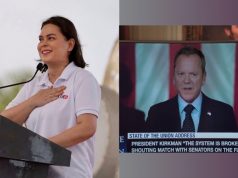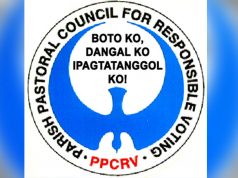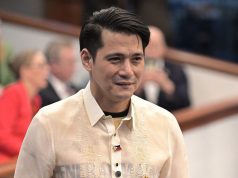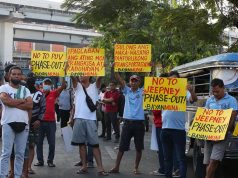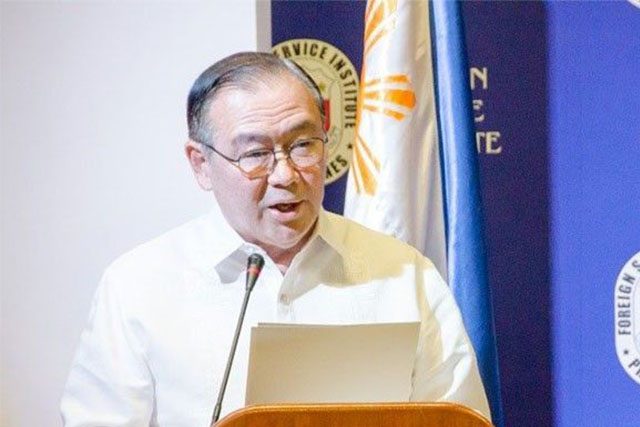
Foreign Affairs Secretary Teodoro “Teddy” Locsin Jr. on Wednesday offered clarification for his remarks on young people after being criticized online for saying that they can be “pretty stupid” in terms of governance.
“The young are not to be rejected out of hand for their youth but on the other, they are not to be taken in on that basis alone… context below,” Locsin said.
The top diplomat reiterated his stance following the online backlash and included screenshots of his previous remarks.
His controversial remark was taken from his tweet where he responded to a Twitter user accusing him of having a fallacious argument in saying that young people are “pretty stupid” in terms of serving the public.
Locsin responded that he was once young too and “brave like Sonny Dominguez in the service of democracy.”
“The young are not to be rejected out of hand for their youth but on the other, they are not to be taken in on that basis alone: Past service of the real kind is essential,” he continued.
The young are not to be rejected out of hand for their youth but on the other they are not to be taken in on that basis alone… context below. pic.twitter.com/E7bcOlU9L1
— Teddy Locsin Jr. (@teddyboylocsin) May 27, 2020
Locsin also included his response to another Twitter user where he implied that young people are not honest in terms of his experience as a Congressman.
He formerly served Makati City as its first district representative from 2001 to 2010.
Locsin vs the youth
Locsin’s controversial remarks against the Filipino youth stemmed from his initial comment on a news item published by Inquirer.net which reported the calls of private hospitals and some senators to replace Health Secretary Francisco Duque III.
The report said that a group of private hospital administrators asked President Rodrigo Duterte to fire Duque and replace him with someone who has a “fresh mind” to lead the Department of Health and the Philippine Health Insurance Corp.
The incumbent health chief has been criticized for how he is leading the health sector amid the COVID-19 pandemic.
“Not someone young, please. They can be pretty stupid believing that enthusiasm makes up for lack of experience, intelligence, education,” Locsin said as he retweeted the news item.
“They will act cute before the cameras but they won’t get anything done because they won’t be respected by the rest of government and society,” he added.
In his succeeding tweets, Locsin responded to some online users and described young people “greedy” and “lazy,” supposedly basing it on his experience in the Congress.
My experience in Congress. The young were greedy and lazy. https://t.co/AWMpwqUqym
— Teddy Locsin Jr. (@teddyboylocsin) May 26, 2020
This comment earned him criticisms from the youth, who called it his “Ok boomer” moment. The expression is used to call out adults, specifically older people, who are perceived to be out of touch.
RELATED: Top diplomat Locsin’s Twitter account stormed with ‘ok boomer’ replies
A human rights activist, who also serves as a co-convenor in a network of the country’s young public servants, rebutted with examples of how the youth made historical impacts in the Philippines.
Some of these include Jose Rizal who finished “Noli me Tangere” in his 20s, Andres Bonifacio who founded the Katipunan in his late 20s and Emilio Jacinto who joined the revolutionary movement during his youth.
“With all due respect, Secretary Locsin, we are a potent force. Our republic was built on the enthusiasm, vision, and sacrifice of the youth. And it continues to survive up to this very day because we continue to be indefatigable actors in the modern sense of nation-building,” Bryan Gonzales said in a Facebook post.
Another Facebook user shared Locsin’s controversial tweet and claimed that such thought “hampers the progress of nations.”
“Age does not define maturity,” he pointed out.
The youth in society
The 1987 Philippine Constitution, considered the highest law of the land, also recognizes the youth in nation-building itself.
Section 13 of Article II specifically states:
“The State recognizes the vital role of the youth in nation-building and shall promote and protect their physical, moral, spiritual, intellectual, and social well-being. It shall inculcate in the youth patriotism and nationalism, and encourage their involvement in public and civic affairs.”
A piece from The Conversation titled “Why we should pay attention to the power of youth,” said that young people “gain new skills when they become engaged politically.”
“If they participate when they are young, they are also more likely to participate later on. Adults also benefit by learning from youth, and society benefits from the new ideas and the fresh perspective of young people, as well as from their future participation,” an excerpt of the article read.




